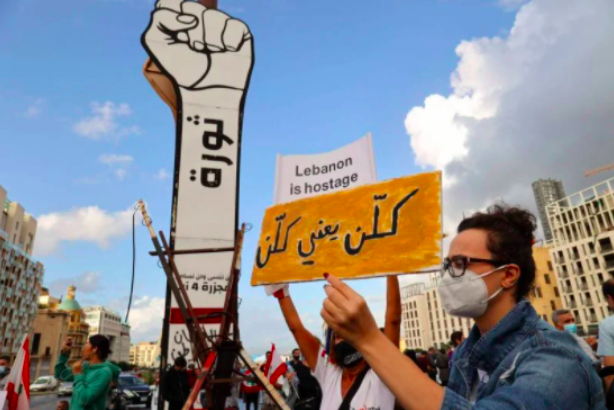
Demonstrators protesting near the Fist of the Revolution, symbol of the October 17, 2019 protest movement, in downtown Beirut on October 17, 2021. (Credit: Anwar Amro/AFP)
BEIRUT — May’s legislative elections are anxiously awaited by Lebanese citizens hoping they might bring political change and put the country on track to solve its multiple crises.
The arena appears to be more open this time around than it was in 2018, particularly in Beirut, following former Prime Minister Saad Hariri’s decision not to participate. The electoral field is also marked by the emergence of multiple opposition parties and lists — among them, a key player that was once seen as the first glimmer of hope for new civil society groups to break into the old boys’ club of Parliament: Beirut Madinati.
But, this time, rather than being the main opposition group as it was in the 2016 municipal elections, Madanati is just one of many players, begging the question: Given the proliferation of anti-establishment groups, can its platform still appeal to the voters?
Beiruti Madinati started as an electoral campaign for the Beirut municipal elections of 2016, in the wake of the 2015 trash crisis in the capital that birthed the “You Stink” protest movement.
That campaign was organized around a municipal program, said Nada Sehnaoui, general coordinator of Beirut Madinati and a current candidate on its list in Beirut I.
“The reform that was asked for on Oct. 17, 2019, was the reform we started in 2016,” she said. “We are not an ideological group, we are a pragmatic group whose main focus is people’s interest, well-being and rights.”
According to Sehnaoui, the campaign was sparked by “the dream of having an inclusive city where we can all lead decent and happy lives, like any city in the world.”
“People believed in this dream, and 40 percent of the total residents in Beirut voted for Beirut Madinati, while 60 percent of people in Beirut I voted for them,” she said
Beirut Madinati did not field candidates or form lists in the 2018 elections, because the general assembly concluded that they were not yet ready for such an endeavor.
“We did a lot of hard work since and became much stronger today,” Sehnaoui said. In 2019, the group lodged a notice of recognition to become a political party “with a very clear horizontal organization,” she said.
There are three benchmarks for the opposition group’s emergence in Beirut, said Ibrahim Mneimneh, candidate for a Sunni seat in Beirut II on the Beirut the Change list, and a former candidate for municipal office who ran with the Beirut Madinati campaign. According to Mneimneh,those benchmarks are the municipal elections, the parliamentary elections in 2018 and the upcoming parliamentary election.
“Municipal elections came at a time of political deadlock in Lebanon, some months before the presidential vacuum was filled by electing Michel Aoun,” Mneimneh said, adding that there “was also a trash crisis in the country and protests were being held against people of the establishment. Thus the emergence of independent candidates [who ran on Beirut Madinati’s list] created a positive shock and a binary between authorities and oppositional groups.”
But now, the landscape is more complicated. In Beirut I alone, there are three different lists categorized by the electoral advocacy group Sawti as “alternative.” Alongside the Beirut Madinati list, there is a competing list put forward by Citizens in a State (MMFD), and the Li Watani list, put together by Tahalof Watani along with other civil society groups.
Similarly in Beirut II, there are three different opposition groups, among them Beirut Madinati, Beirut the Change and MMFD.
Carmen Geha, a research specialist in the political dimensions and political context of public institutions, asserted that “now is not a good time to have several opposition electoral lists in one constituency.”
“This technique can be adopted once the experience of having opposition lists is 10 to 15 years old, when opposition groups are organized as movements,” she continued.
Geha said she had expected Madinati to launch a national campaign earlier in the election cycle and then organize themselves in groups across the regions of Lebanon.
“Madinati started locally, but they should have launched nationally and made a public opinion that there are opposition groups in the country and [they] are unified,” she said.
In fact, Beirut Madinati did expand outside of Beirut, but tentatively, rebranding themselves from Beirut Madinati to simply Madinati.
“We have two candidates, one in Saida [Hania Zaatari, South I ] and one in the South [Wassim Ghandour, South III] running under Madinati,” Sehnaoui said.
Sehanoui explained Madinati’s tentative expansion, saying, “We don't take extra steps when we are not confident about our capabilities. Next time, when we grow stronger, we will have more candidates in other regions.”
“We are serious people and unlike certain lists whose candidates are expats, our candidates are equipped with defiant nationalism and go through a vetting process,” she added, taking a swipe at some of the other opposition groups.
Mneimneh said he did not join Beirut Madinati this year because his preference was to run on a list that unifies opposition parties. In the 2018 parliamentary elections, in which Madinati did not take part, he ran with a campaign called Kilna Beirut.